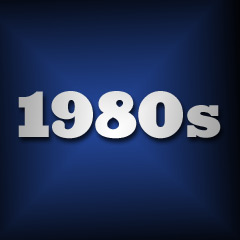
|
![]()
Greatest Films of the 1980s
1980 | 1981 | 1982 | 1983 | 1984 | 1985 | 1986 | 1987 | 1988 | 1989
Title Screen Film Genre(s), Title, Year, (Country), Length, Director, Description 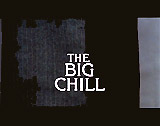
The Big Chill (1983), 103 minutes, D: Lawrence Kasdan


A Christmas Story (1983, US/Can.), 94 minutes, D: Bob Clark
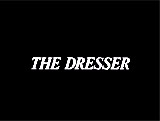

The Dresser (1983, UK), 118 minutes, D: Peter Yates
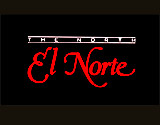
El Norte (1983, US/UK) (aka The North), 139 minutes, D: Gregory Nava
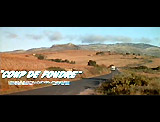


Entre Nous (1983, Fr.) (aka Coup de Foudre), 110 minutes, D: Diane Kurys
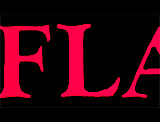


Flashdance (1983), 95 minutes, D: Adrian Lyne
Adrian Lyne's R-rated sleeper hit was a musical romantic drama with energetic, highly-choreographed, fast-paced, glossy MTV-type, rock music-video style dance sequences and vignettes. The film featured a soundtrack of hit songs, and turned out to be an unexpected major box-office success and cultural touchstone, even though it was a formulaic, implausible Cinderella story. It brought marketing attention to two new fads: break-dancing and torn/cut-off-the-shoulder gray sweatshirts. In the story's opening, Pittsburgh steel-mill welder/ exotic bar dancer Alexandra "Alex" Owens (Jennifer Beals) was performing at Mawbry's Bar. The pretty, self-doubting 18 year-old worked by day as a Pittsburgh steelyard welder, and at night as an exotic dancer in a local blue collar, working-class bar. Living in the loft of a huge abandoned and converted warehouse, she also aspired to become a professional ballet dancer, and often exercised or performed vigorous dance routines. She initially entered reluctantly into a romance with her persistent, handsome, older, wealthy steel-mill boss Nick Hurley (Michael Nouri). During a seductive scene between them, she tantalized him during a lobster dinner - while she was dressed in a black tux. She slowly nibbled and sucked soft pieces of seafood, and suggestively asked: "What turns you on?" In the film's climactic dance sequence, Alex (wearing a black leotard and ankle warmers) auditioned before the Pittsburgh Conservatory of Dance and Repertory to the tune of the Oscar-winning Best Song "Oh, What a Feeling!" (sung by Irene Cara), and although she faltered, she was allowed to continue and was able to be accepted to the Conservatory. In a cliched, upbeat romantic conclusion, she was reunited outside by Nick with a handful of long-stemmed red roses, a twirl and a loving kiss in the freeze-framed, dialogue-less conclusion.

Local Hero (1983, UK), 111 minutes, D: Bill Forsyth
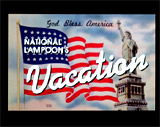
(National Lampoon's) Vacation (1983), 98 minutes, D: Harold Ramis
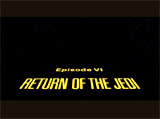

Return of the Jedi (1983) (aka Star Wars Episode VI: Return of the Jedi), 132 minutes, D: Richard Marquand
In this epic conclusion to the entire action-oriented, sci-fi Star Wars Trilogy Saga, Luke Skywalker (Mark Hamill) had returned to his home planet of Tatooine (with his two droids C3PO and R2D2) in an attempt to rescue his space-pilot friend Han Solo (Harrison Ford) (still in carbon freeze) from vile, hookah-smoking gangster Jabba the Hutt, a grotesque and repulsive slug-like creature. The Rebels were on the run, continually being driven from one hiding place to the next. The evil Emperor Palpatine (Ian McDiarmid), the Sith mastermind who had engineered the creation of the Galactic Empire and the fall of Anakin Skywalker, was planning the doom of the Rebellion by constructing a new, more powerful Death Star space station - to be placed in orbit around the forest moon of Endor, although it was falling behind schedule. A daring escape attempt by Leia (Carrie Fisher) (disguised as a bounty hunter) to free Solo from Jabba the Hutt failed, resulting in her imprisonment as a harem slave-girl, along with Chewie, Luke, and the droids, although they were able to ultimately free themselves and destroy Jabba. Their next plan was to rendezvous with the assembled Rebel Alliance (led by Lando Calrissian (Billy Dee Williams)), and mount a massive attack on the Emperor and his new space station, which was located orbiting the forest moon of Endor. (If the Rebel fighters could penetrate its force field, they could target the space station's main reactor and destroy it.) Meanwhile, Luke returned to Dagobah, thinking he would finish his Force-training with aging Yoda, but the Jedi Master soon faded into oneness with the Force. Just before his death, Yoda had confirmed that the Dark Lord Darth Vader (voice of James Earl Jones) was Luke's father - and a ghostly image of Ben (Obi-Wan Kenobi) (Alec Guiness) revealed that Luke's twin sister was Leia. (Ben also explained that what he had told Luke before was true - that Anakin Skywalker was for all intents and purposes 'killed' when he became Darth Vader.) Solo, Leia, Luke, the two droids, and Chewie engaged in a dangerous mission to Endor, where they were aided by furry bear-like alien creatures known as Ewoks. A climactic duel pitted Luke against his father Darth Vader one last time, as the evil Emperor watched their struggle. Luke did not kill Vader when he had the chance. Although mortally-wounded, Vader made a redeeming choice to save Luke and kill the Emperor (who was threatening Luke with purple bolts of lightning and slowly killing him), in order to save his son. Vader/Anakin Skywalker heaved the Emperor's body into an abyss, where he was torn apart by the Death Star generators, and then, after renouncing the Dark Side of the Force - and with the redeemed face of Anakin Skywalker (Sebastian Shaw), Vader died in his son Luke's arms. With the Death Star's shield deflector destroyed, the Rebels commenced an attack on the unprotected Death Star's main reactor, and the space station was obliterated. Meanwhile, Luke had taken an Imperial shuttle and escaped from the exploding Death Star with his father's corpse, and that evening on the forest moon of Endor (as the rebels celebrated the destruction of the Death Star, their ultimate victory over the Empire, and the demise of the Emperor), Luke privately burned his father's armored body in a funeral pyre. On Endor, the Rebels celebrated their victory as Luke looked at the happy, reunited ghost-spirits of Ben "Obi-Wan" Kenobi, Jedi master Yoda and then Anakin (his father) smiling upon him.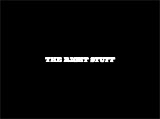
The Right Stuff (1983), 192 minutes, D: Philip Kaufman
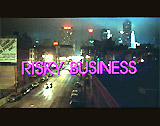

Risky Business (1983), 98 minutes, D: Paul Brickman
Writer/director Paul Brickman's debut film was an effective, satirical and well-received teen, coming-of-age sex comedy that equated the rewards of sexuality and a successful capitalistic Horatio Alger-like enterprise. The main character was Glencoe, Chicago suburbia-dwelling, college-bound high school Joel Goodson (Tom Cruise), who was faced with a few major pressures - losing his virginity, getting admitted to college, and becoming a successful businessman. Joel received repeated advice from his prankster friend Miles Dalby (Curtis Armstrong) to live freely: "Sometimes you gotta say, 'What the f-k.' Make your move....Every now and then say, 'What the f--k.' What the f--k gives you freedom. Freedom brings opportunity. Opportunity makes your future" - it was especially good advice to use during Joel's upcoming parents' one-week vacation trip to Europe: ("What the f--k.' If you can't say it, you can't do it"). Joel decided to experience a good time while his materialistic, strict parents were away, including the film's most memorable sequence - Joel's exhibitionist-karaoke scene, including his floor-sliding entrance into the front hallway while solo dancing, wearing white socks, a long-sleeved button-downed pink-striped shirt, and tight cotton underwear, as he lip-synched (and air-guitared) to the tune of Bob Seger's "Old Time Rock & Roll" in his family's living room. At school, Joel was participating in an extracurricular group called Future Enterprisers of America - as a competing team, his goal was to create a small business company and product (and market it) - so that it would look good on his record for college (Princeton preferably, according to his father's and mother's wishes). Exhibiting extreme worry about his manhood and his future, Joel phoned a referral contact - a call-girl/prostitute named Lana (Rebecca DeMornay), and that evening - during an erotic, dream-like sequence, she appeared in his living room for sex. The two found themselves fleeing from her crazed and angry, gun-wielding "manager" (or pimp) Guido (Joe Pantoliano). She and her hooker friend Vicki (Shera Danese) were able to seek refuge at Joel's house. Lana proposed an idea to Joel - he could raise a lot of money in just a few days - by matching up his friends with her friends, and she even suggested she'd be his girlfriend for free. After an accident resulted in the destruction of his father's $40,000 Porsche in Lake Michigan, and for his insubordination, Joel received a 5-day suspension from school (for his unexcused absence) and was thrown out of Future Enterprisers, Joel was forced to accept Lana's suggestion - he marveled at her ability to organize and profitably transform his house into a make-shift brothel (with her many call-girl co-workers), to make him a successful entrepreneur sharing in the profits. He was amazed by her capitalist risk-taking skill: ("It was great the way her mind worked. No guilt, no doubts, no fear....None of my specialties. Just this shameless pursuit of immediate material gratification. What a capitalist. She told me I could make more money in one night than I'd make all year"). In the midst of a party held on Friday night (with the hookers and Joel's high-school friends), Joel was interrupted by Princeton University recruiter Bill Rutherford (Richard Masur) for a pre-arranged appointment-interview for admission. In a daring and risky late-night scene after the party, high-class hooker Lana and Joel became sex-exhibitionists during a deserted, elevated CTA subway ride. In the conclusion, Lana's menacing pimp Guido (with Vicki) stole all the furniture in Joel's house as pay-back (during the possible 'set-up' by Lana to take him away on the train during the night), forcing Joel to buy it back and move it all back into the home with the help of his friends just before his parents arrived later that Saturday from the airport in a taxi. The film's ending quote proved Joel's business prowess and his successful dealings in "human fulfillment" - he had become a wealthy entrepreneur overnight , had won the school club's competition, and also had been admitted to Princeton as an Ivy League college-bound graduate. The film's last line (voice-over): "My name is Joel Goodson. I deal in human fulfillment. I grossed over eight thousand dollars in one night. The time of your life, huh, kid?"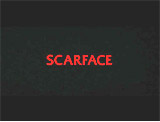


Scarface (1983), 170 minutes, D: Brian De Palma
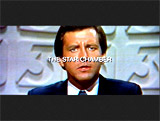




The Star Chamber (1983), 109 minutes, D: Peter Hyams
In this mystery cop thriller-drama, small technicalities in the law (such as illegal search and seizures, forbidden by the 4th Amendment) were hindering the pursuit of justice. Conscientious LA Judge Steven Hardin (Michael Douglas) was becoming increasingly frustrated when he had to disregard crucial evidence in cases where confirmed criminals were breaking the law, but were defended by clever defense lawyers who knew all the loopholes. There were two shocking cases of the miscarriage of justice: (1) killer Hector Andujar (Domingo Ambriz) murdered five old women (for their welfare checks), but then the case was dismissed regarding the illegal seizure of the murder weapon in his garbage, and (2) marijuana was suspected in the van (with unpaid parking tickets and warrants) of Lawrence Monk (Don Calfa) and Arthur Cooms (Joe Regalbuto), where the bloody shoe of young murder victim Danny Lewin was found; however it was ruled that the police were unlawful in stopping the van with no probable cause, because the computer had erroneous information. In anger and devastation, Danny's father Dr. Harold Lewin (James Sikking) attempted to take the law into his own hands and kill the two child murderers Monk and Cooms in the court, but injured a police officer instead. The distraught father committed suicide in jail. Mentor and fellow Judge Benjamin Caulfield (Hal Holbrook) inducted the disillusioned Hardin into the Star Chamber, an underground group of nine embittered judges who met in secret to retry cases as modern-day vigilantes (judge, jury, and executioner), with one basic premise: if found guilty, the accused were to be assassinated by hired killers. Monk and Cooms were discovered to be not guilty by police Detective Harry Lowes (Yaphet Kotto). However, the Star Chamber had already ruled that the two men were to be targeted, and the hit could not be withdrawn. Desperate to stop the unwarranted murder of two innocent men (even though they were despicable and had committed other crimes, such as child pornography and drug dealing), Judge Hardin went rogue and attempted to track down the two and warn them. When he came upon them in an abandoned warehouse, they were in the midst of an illegal drug operation, and they didn't believe him. Although threatened with his life, Hardin was saved by the hitman (disguised as a police officer) who killed Monk and Cooms. Then, Hardin himself escaped death when Lowes arrived and killed the hitman. In the brief epilogue, Hardin and Lowes were attempting to bring down the Star Chamber by wire-tapping its illegal activities.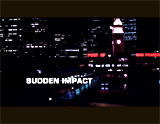



Sudden Impact (1983), 117 minutes, D: Clint Eastwood
This was the fourth "Dirty Harry" film (and the highest grossing film of the series extending for 17 years from 1971 to 1988), and noted as the only one that was directed by star Clint Eastwood. The violence-ridden, seamy and grim movie was another iteration of Eastwood's contemptuous, anti-heroic character of a 'wild West' vigilante-law enforcer Harry Callahan on the loose who consistently defied authority, legal guidelines and bureaucratic policies and his superiors in an urban setting. This was the film noted for its classic diner-coffee shop scene in which Harry single-handedly foiled a robbery by four black suspects and issued his famous trademark warning: "Go ahead, make my day." There were a number of other set-pieces or vignettes with little relationship to the main plot. Harry crashed the wedding of the grand-daughter of crime boss Threlkis (Michael V. Grasso) and caused the mobster to have a heart attack, was chased by three punks who threw molotov cocktails into his car before their car plunged into the bay and they drowned, and eliminated Threlkis' mobster hitmen who tried to seek retribution by murdering him. In the film's main story, set in May of 1983, artist/painter Jennifer Spencer (Sondra Locke) was vengefully tracking down - one by one - and executing an unpunished gang of five men and one nasty, ultra-butch, crude-talking lesbian (named Ray Parkins (Audrie J. Neenan)) who had raped her and her sister Elizabeth "Beth" (Lisa Britt) a decade earlier, leaving her sister completely catatonic and hospitalized. The brutal rapes had occurred in her coastal seaside resort town of San Paulo (a semi-disguised Santa Cruz, CA) at the beach under the boardwalk area. After running afoul of the law, SF homicide detective Harry Callahan (Clint Eastwood) was ordered to take an "R & R" vacation to San Paulo, to look into information on the first of Jennifer's murder victims, George Milburn (Michael Maurer). The killings were committed with a specific modus operandi ("a .38-caliber vasectomy" - shots to the groin and head). Harry also found himself at odds with local San Paulo police chief Lester Jannings (Pat Hingle) in the small resort town who inexplicably was uncooperative, and became involved investigating further homicides in town with the same MO, after he single-handedly confronted a bank robber in town during an aborted heist. Callahan met Jennifer who was working in her hometown to restore the amusement park's carousel, while she was vengefully targeting the members of the gang. When she was about to kill one of her last targets, Sheriff Jannings's catatonic son Alby Jannings (Matthew Child), she was ambushed by Mick (Paul Drake), the most vicious psychopath in the group of rapists. Mick, accompanied by two Kruger brothers: Eddie (Russ McCubbin) and Carl (Robert Sutton), killed Chief Jannings (using Jennifer's gun to frame her) and then abducted Jennifer. The threesome dragged her into the deserted amusement park fairground and boardwalk to relive her rape experience. The bruised and beaten Callahan suddenly appeared on the boardwalk, seemingly back from the dead, and killed the two brothers. Mick held Jennifer as a protective shield, but Harry was able to blast him with four shots, causing Mick to fall backwards through the roller coaster's wooden railing and crash through the roof-top of the spinning carousel far below. He met his deserved fate by being phallically-impaled on the horn of one of the wooden unicorns on the carousel. As the film concluded, Jennifer's .38 Colt Detective Special hand-gun (used for all of her revenge killings) was found on Mick's body. Callahan compassionately took advantage of the opportunity to cover up Jennifer's vengeful crimes and pin the serial killings on Mick.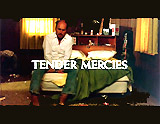

Tender Mercies (1983), 92 minutes, D: Bruce Beresford




Terms of Endearment (1983), 130 minutes, D: James L. Brooks
This comedy/drama classic, an entertaining film was also a manipulative, soap-operatic melodramatic tearjerker, with an ending similar to Dark Victory (1939) and Love Story (1970). Its tagline was: "Have you come to Terms yet?" The feel-good, box-office hit from writer/director/producer James L. Brooks (his first directorial effort) was based on the novel of the same name by Larry McMurtry. It was a major Academy Award winner in 1983, with eleven nominations and five Oscars (including Best Picture, Best Actress, and Best Director). A sub-par sequel, titled The Evening Star (1996) found Shirley MacLaine reprising her role fifteen years later, as a grand-mother to her daughter Emma's three children, and Jack Nicholson with only a short cameo appearance. The 1983 fim told about the thirty-year mother-daughter relationship between two women: stubborn brunette Emma (Debra Winger) and her devoted, possessive, blonde, widowed mother Aurora Greenway (Shirley MacLaine). They endured Emma's marriage, separation, and illness. As a young adult, the independent-minded Emma rebelled against Aurora's attentions, and against her advice married literature student Flap Horton (Jeff Daniels), and then moved with her family from Houston, TX to Des Moines, IA. While the young couple suffered from unpaid bills, young mother Emma also discovered that her feckless husband, a college literature professor, was unfaithful and sleeping with one of his graduate students; she retaliated with her own brief affair with a timid Iowa bank officer Sam Burns (John Lithgow). Meanwhile, Aurora also engaged in a hilarious romance with her next-door neighbor - boozy, beer-bellied, over-the-hill, former astronaut Garrett Breedlove (Jack Nicholson). Their relationship was the comedic highlight of the film - the self-indulgent, horny playboy's flirtatious womanizing with reluctant, stiff and similarly middle-aged Aurora was hilarious. Their first, much-delayed luncheon date ended with a drunken ride into the Gulf of Mexico in his open-roofed Corvette. Soon after, she invited him over to her bedroom to look at a Renoir painting - her pretext for "lights-off" sex. In the heartbreaking, unexpected, tragic, cathartic and touching finale, Aurora's 30 year-old daughter Emma was diagnosed with terminal cancer and then hospitalized. She was slowly reconciled with her mother during her illness. During an emotional hospital scene, Aurora went beserk, panicked and shrieked as she demanded that the nurses give her dying daughter her overdue shot of morphine: "GIVE MY DAUGHTER THE SHOT!!" Before her death in her Lincoln General Hospital room, Emma had one last hospital goodbye scene with her children - her distant, bratty, over-critical oldest son Tommy (Troy Bishop), after her youngest son Teddy (Huckleberry Fox). Soon after, Emma expired with one final glance at Aurora as Flap slept unawares. During the final end credits scene set at Aurora's house after the funeral, Garrett proved his decent, sensitive and fatherly nature when he provided needed support and paid special attention to Emma's long-neglected older boy Tommy: ("Good-lookin' suit there") and won over the reluctant boy; meanwhile, Aurora spent time with young Melanie (Megan Morris).




Videodrome (1983), 87 minutes, D: David Cronenberg
Director David Cronenberg's film was a terrorizing and shocking hallucinatory tale of erotic science fiction and "body horror." The film's theme was the prophetic prediction that TV would replace 'real-life', as conspirators in a nightmarish cult wanted to entice (control and manipulate) the docile, consumer-oriented masses by marathon television watching (of extreme sex and violence). It involved kinky sexuality, extreme S&M and orgiastic mutilation, and reality-manipulating TV. One memorable phrase was: "Long live the new flesh." In the story, seedy Max Renn (James Woods) was the sleazy owner-director-producer of an X-rated Toronto cable TV station (Channel 83). He discovered a pirated, ultra-violent underground TV show called Videodrome captured on a VCR cassette - the reason for the film's title; it was a depraved torture/snuff film. The station aired soft-core pornography and violent content, and Renn desired to broadcast the pirated VCR cassette to increase ratings and provide more sensationalized content. Renn didn't know that he was being used by the villainous political forces behind Videodrome - the Spectacular Optical Corporation (and Videodrome's producer), headed by Chief of Special Programs Barry Convex (Leslie Carlson). Renn was deceived into becoming mind-controlled and infected, by watching (and becoming hooked on) Videodrome; Spectacular Optical's goal (with the motto "Keeping An Eye on the World") was to seize and take over Renn's Channel 83 TV station to broadcast its signal to the masses ("It can be a giant hallucination machine, and much much more!"). A mind-controlled Renn began to become infected due to his own TV watching (that seduced and controlled him), leading to his brain mutating and developing fatal tumors, and he was experiencing many disturbing, mind-altering visions and sights. Exposure to the Videodrome film caused carcinogenic tumors that triggered hallucinations in Max. Sexual imagery later in the film included a vaginal-like slit or womb-wound orifice that opened in his abdomen (into which he could insert videocassette tapes, or his entire hand holding a gun) as he became an organic video-recorder. He could be both "raped" and "programmed" by the villains forcefully inserting videotapes inside his body to "play" him. Max engaged in a torrid and bizarre S&M romance with self-help radio guru-personality Nicki Brand (rock star Deborah Harry or Blondie) - their first encounter in Max's apartment when she proposed "Wanna try a few things?" revealed her interest in masochistic sadism (piercing her body with a long needle, and burning her bare breast with Max's cigarette), and voyeurism when she encouraged him to play the cassette "Videodrome" as they made love. In the film's most notable scene, Max watched a videocassette of Videodrome's origins on his TV set (including the strangulation of Videodrome technology cult leader and pioneer Professor Brian O'Blivion (Jack Creley) when he learned of Spectacular Optical's malicious intentions), revealing the black-hooded executioner as Nicki - his 'girlfriend'. She beckoned Max: "Come to me now. I'm Nicki. Don't keep me waiting." In the film's most stupendous, surrealistic scene, her seductive red lips enlarged on his TV screen (the set itself undulated, pulsated, formed engorged veins, and moaned as if sexually-aroused). He submissively fell to his knees and pushed his own lips into the enlarged and bulging hallucinogenic TV screen image to kiss them -- a symbolic metaphor for oral sex (cunnilingus), as he was sucked into the glass monitor's image. Renn was later programmed and ordered by Convex to "kill your partners and give me Channel 83" - in order to take over the channel (and broadcast Videodrome as part of a crypto-government conspiracy to morally and ideologically "purge" North America and produce fatal brain tumors in "lowlifes" fixated on extreme sex and violence); however, Renn was soon after deprogrammed and ordered to reverse himself, and instead kill the creators and manipulators of Videodrome ("Death to Videodrome. Long live the new flesh"). Afterwards, Renn assassinated his own technical colleague Harlan (Peter Dvorsky), revealed to be a double-agent working for Spectacular Optical and Convex, by transforming Harlan's hand into a slimy gun-grenade set to explode. Renn also murdered Barry Convex at the Spectacular Optical trade show at the Toronto Convention Centre - he shot him with his organic gun that caused tumors to erupt from his torso and skull. In the conclusion, Renn was convinced to ultimately take his own life to ensure the total and complete destruction of Videodrome - first, Nicki prompted him to kill himself by having him watch a TV broadcast of himself blowing his own head open, causing the TV set to explode; then, Renn committed an imitative suicide with his own organic hand-gun, and as he pulled the trigger for real, he proclaimed: "Long live the new flesh."

Zelig (1983), 80 minutes, D: Woody Allen